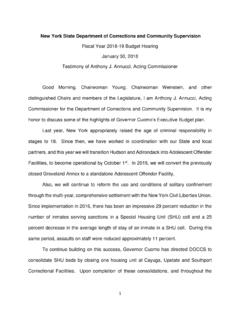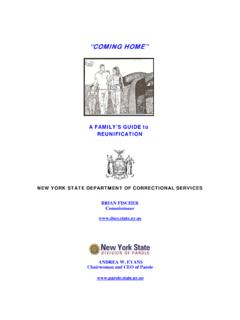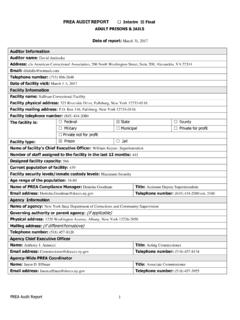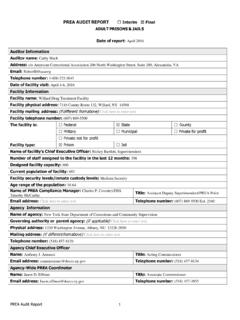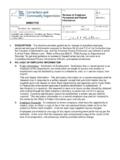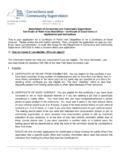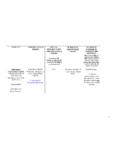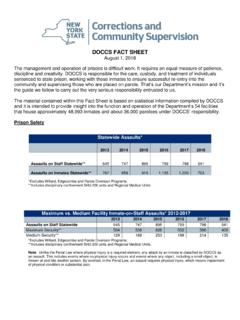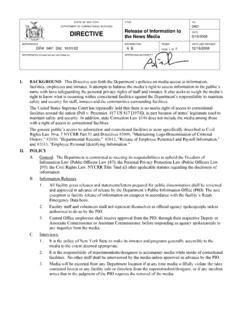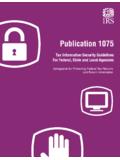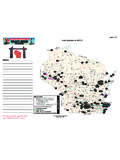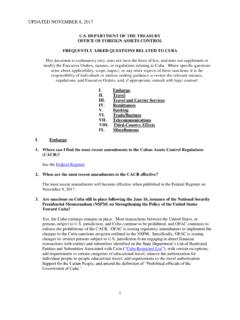Transcription of DIRECTIVE - New York State Department of Corrections and ...
1 TITLE NO. 4500. Family Reunion Program DATE. 1/5/2016. DIRECTIVE . SUPERSEDES DISTRIBUTION PAGES DATE LAST REVISED. DIR #4500 Dtd. 4/21/2011 A B PAGE 1 OF 14. REFERENCES (Include but are not limited to): APPROVING AUTHORITY. Americans with Disabilities Act; 7 NYCRR Chapter V;. Directives #2612, #2614, #4403. I. DESCRIPTION: The Family Reunion Program (FRP) is designed to provide approved inmates and their families the opportunity to meet for an extended period of time in privacy. The goal of the program is to preserve, enhance, and strengthen family ties that have been disrupted as a result of incarceration. II. RIGHT TO APPLY: Any inmate has the right to submit an application for participation in the FRP if their current facility of residence offers the program. Eligibility for the FRP is to be determined during the processing of the inmate's application.
2 The date the application is received and date stamped by the FRP Offender Rehabilitation Coordinator (ORC) will be considered the application date. The inmate is responsible for the accuracy of the information provided on the application. Incomplete or inaccurate applications will be returned to the inmate, and the inmate may then submit a new application with the complete and accurate information. Modifications or revisions to an application or appeal are not allowed. Multiple applications or appeals will not be accepted. III. REASONABLE ACCOMMODATIONS: Disabled inmates and disabled visitors may request reasonable accommodations. Inmates shall utilize DIRECTIVE #2614, Reasonable Accommodations for Inmates with Disabilities, or DIRECTIVE #2612, Inmates with Sensorial Disabilities. A written request from the visitor for reasonable accommodations must be forwarded to the FRP ORC.
3 Such a request will be reviewed by the Superintendent and the Americans with Disabilities Act Coordinator. The reviews will be conducted in accordance with Titles II and III of the Americans with Disabilities Act. The FRP decision will be determined after the reasonable accommodation request is complete. Reasonable accommodation approval does not imply approval for participation in the FRP. IV. INMATE ELIGIBILITY. A. Preconditions: An inmate must meet the following preconditions to be eligible to participate in the FRP: 1. Time a. New Inmate: The inmate has been in the Department 's custody for at least six months, excluding initial reception, and is, at the time of application, a resident of a facility that offers the program. b. Transferred Inmate: An inmate who has successfully participated in the FRP. at one facility, and is transferred to another facility where the program is offered, may apply immediately for participation.
4 An inmate who has not participated at his or her previous facility must wait 30 days to apply for the program. This will give the inmate time to have an assessment at the new facility. c. An inmate who is within 90 days to Earliest Release Date (ERD) will no longer be eligible for participation. NO. 4500, Family Reunion Program DATE 1/5/2016 PAGE 2 of 14. 2. Adjustment: The inmate has exhibited a pattern of good institutional adjustment and has not had any MAJOR, SEVERE, CHRONIC, or EXCESSIVE disciplinary problems. Any inmate serving disciplinary sanctions, to include loss of privileges, that run concurrent with a scheduled FRP visit, will have that visit cancelled. Upon completion of disciplinary sanctions, the visit may be rescheduled. a. Major Disciplinary Problem: Shall be defined as any Tier II or Tier III. disciplinary disposition, in the eight weeks prior to the application, resulting in confinement to cell, room, or dorm continuously, on certain days or during certain hours, for 15 days or more; or any loss of good time.
5 Reapplication may be made eight weeks from the confinement release date. Satisfactory behavior must be maintained throughout the duration of the application and or appeal. Any major disciplinary problems incurred during the application/appeal process will result in a denial or termination of the application/appeal. The inmate will become ineligible to reapply for eight weeks, as defined above. b. Chronic Disciplinary Problem: Shall be defined as three or more Tier II or III. disciplinary dispositions in the six months prior to the application, or an accumulation of 45 days or more Keeplock/SHU in the six months prior to the application. c. Severe Disciplinary Problem: Shall be defined as a conviction for a Federal or State crime while incarcerated or any Tier II or III disciplinary report which includes: (1) A Penal Law offense;. (2) Rioting;. (3) Escape.
6 (4) Use or possession of drugs or alcohol;. (5) Unauthorized group activities;. (6) Gangs;. (7) Assault on inmate;. (8) Assault on staff;. (9) Assault on other;. (10) Sex offense;. (11) Forcible touching;. (12) Lewd exposure;. (13) Lewd conduct;. (14) Explosives; or (15) Arson. A conviction or disciplinary finding for any of these severe infractions will result in a suspension from the FRP: Tier II imposes a six month suspension, Tier III. imposes a 12 month suspension. Suspensions begin after any disciplinary confinement is served. Applications will not be accepted until suspension is completed. A Federal or State crime conviction while incarcerated will require immediate suspension and full cycle review for any possible future participation. NO. 4500, Family Reunion Program DATE 1/5/2016 PAGE 3 of 14. d. Excessive Disciplinary Problems: Shall be defined as having 20 percent, or more, of the past 36 months prior to the application spent in disciplinary confinement.
7 If at the time of the application, the inmate has been incarcerated less than 36 months, the standard will be 20 percent of that time of incarceration. The inmate may reapply for FRP consideration once their discipline is in compliance. e. Program Participation: The inmate applicant must have participated in, or pursued, required programs as identified on his or her Program/Earned Eligibility Plan. Program/Earned Eligibility Plan refusals, negative removals, or regressions make an applicant ineligible until that need is addressed. Any disciplinary behavior which has been exhibited in the inmate's social, criminal, or institutional history will be factored into the option of participating in therapeutic services. Formal therapeutic programs sanctioned by DOCCS, such as Alcohol and Substance Abuse Treatment (ASAT), Comprehensive Alcohol and Substance Abuse Treatment (CASAT), Driving While Intoxicated (DWI), or other approved specialized substance abuse treatment programs, and the Aggression Replacement Training (ART) Program for aggression/violence, are the standards that must be met.
8 Additionally, approved therapeutic self-help services such as Alcoholics Anonymous (AA). and Narcotics Anonymous (NA) may be considered. Participation in self-help services is voluntary and is seen as a supplement to, and not a substitute for, a formalized substance abuse treatment need. Inmates who have actively pursued their plan, yet who have not completed programs and satisfied their needs, will be evaluated according to their entire record. However, dependent on his or her criminal, disciplinary, and programming history, active participation or actual completion of a specific therapeutic or treatment program may be required to satisfy this precondition. When directed to complete a program, inmates must wait until that program is completed prior to reapplication to FRP. Satisfactory completion of any program does not imply FRP approval. B. Disqualifying Conditions: An inmate is not eligible to participate in the Family Reunion Program if any of the following conditions exist: 1.
9 The inmate is eligible for the Temporary Release Program (unless that inmate's application for temporary release has been denied);. 2. The inmate has a higher security designation than permitted at the program site;. 3. The inmate is assigned to a Special Housing Unit (SHU) for disciplinary reasons, or is in administrative segregation, or in a Mental Health Unit (MHU) with concurrent SHU time (Behavioral Health Unit (BHU), Therapeutic Behavioral Unit (TBU), or Regional Mental Health Unit(RMHU));. 4. The inmate had not been in general population for the required period of time;. 5. The inmate had not been in current facility for the required period of time;. 6. The application is submitted prior to meeting conditions set in previous denial;. 7. An inmate participant found in violation of the FRP regulations/standards will have his or her eligibility suspended.
10 Tier II violations impose a six month suspension;. Tier III violations impose a 12 month suspension. A new application must be reviewed and approved by Central Office prior to the inmate's future FRP. participation. Prior approval does not guarantee readmission;. NO. 4500, Family Reunion Program DATE 1/5/2016 PAGE 4 of 14. 8. The inmate or requested visitor is serving any suspension, restriction, or modification to visitation related to DIRECTIVE #4403, Inmate Visitor Program. This includes non-contact visit sanctions; and 9. If it is determined that a visitor commits or attempts to commit to introduce the following contraband into a correctional facility, they will be permanently restricted from participation in the FRP: a. Cell phones or any electronic device that can be used/modified for contact outside of the Department /correctional facility ( , I-pad, Laptop, electronic charging devices, pagers, etc.)
